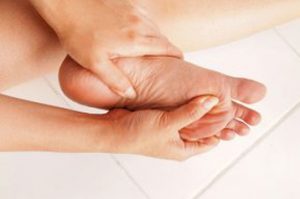 Peripheral neuropathy is a common neurological disorder resulting from damage to the peripheral nerves. The peripheral nerves are the nerves connecting your spinal cord and brain to other parts of your body. It may be caused by diseases of the nerves or as the result of systemic illnesses. Many neuropathies have well-defined causes such as diabetes, uremia, AIDS, alcoholism or nutritional deficiencies. In fact, diabetes is one of the most common causes of peripheral neuropathy. Other causes include mechanical pressure such as compression or entrapment (such as carpal tunnel syndrome), direct trauma, penetrating injuries, contusions, fractured or dislocated bones; pressure involving the superficial nerves (ulnar, radial, or peroneal); intraneural hemorrhage; exposure to cold or radiation or certain medicines; and vascular or collagen disorders. Still, a large number of cases are of an unknown cause.
Peripheral neuropathy is a common neurological disorder resulting from damage to the peripheral nerves. The peripheral nerves are the nerves connecting your spinal cord and brain to other parts of your body. It may be caused by diseases of the nerves or as the result of systemic illnesses. Many neuropathies have well-defined causes such as diabetes, uremia, AIDS, alcoholism or nutritional deficiencies. In fact, diabetes is one of the most common causes of peripheral neuropathy. Other causes include mechanical pressure such as compression or entrapment (such as carpal tunnel syndrome), direct trauma, penetrating injuries, contusions, fractured or dislocated bones; pressure involving the superficial nerves (ulnar, radial, or peroneal); intraneural hemorrhage; exposure to cold or radiation or certain medicines; and vascular or collagen disorders. Still, a large number of cases are of an unknown cause.
Although the causes of peripheral neuropathy are diverse, they produce common symptoms that include weakness, numbness, paresthesia (abnormal sensations such as burning, tickling, pricking or tingling) and pain in the arms, hands, legs and/or feet. Usually symptoms occur on both sides (feet or hands). Peripheral neuropathy can also affect the nerves that control autonomic functions such as heartbeat, bladder control or bowel function. The nerve damage and numbness of peripheral neuropathy can lead to injuries and infections.
Treatment for peripheral neuropathy may require addressing an underlying cause, such as poorly controlled diabetes, alcoholism, or exposure to toxic substances. In cases where a tumor or ruptured disc is the cause, therapy may involve surgery to remove the tumor or to repair the ruptured disc. In entrapment or compression neuropathy, treatment may consist of splinting, surgical decompression of the ulnar or median nerves, or physical therapy combined with acupuncture. Physical therapy and/or splints may also be useful in preventing contractures (a condition in which shortened muscles around joints cause abnormal and sometimes painful positioning of the joints).
Recovery from peripheral neuropathy is usually slow. Depending on the type of peripheral neuropathy, the patient may fully recover without residual effects or may partially recover and have sensory, motor, and vasomotor (blood vessel) deficits. If severely affected, chronic muscular atrophy may occur.
Conditions Treated
-
- Bursitis
- Carpal Tunnel Syndrome
- Chronic Fatigue Syndrome
- Circulation
- Fibromyalgia
- Foot & Heel Pain
- Frozen Shoulder
- Herniated Disk
- Lower Back Pain
- Lumbar Spinal Stenosis
- Migraines
- Neck Pain
- Osteoarthritis
- Peripheral Neuropathology
- Piriformis Syndrome
- Poor Posture
- Rheumatoid Arthritis
- Rotator Cuff
- Sciatica
- Shingles
- Sinusitis
- Tennis Elbow
- TMJ